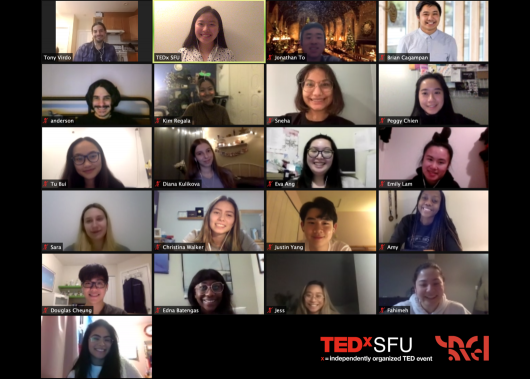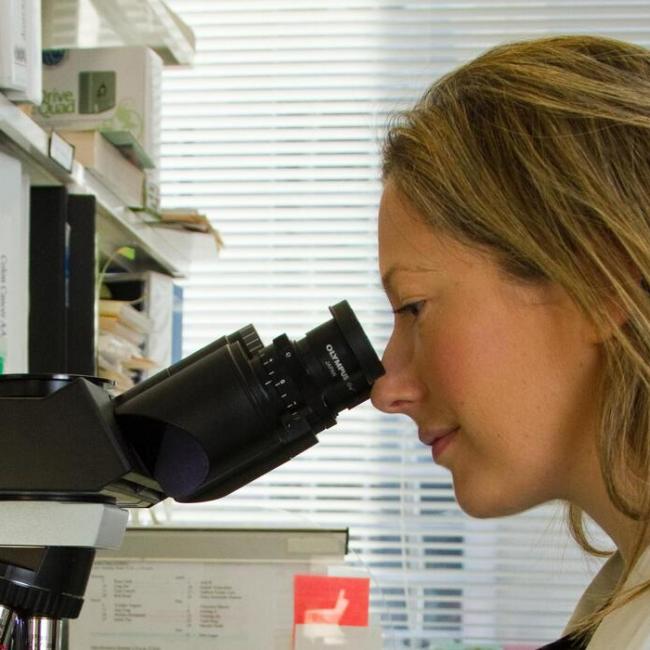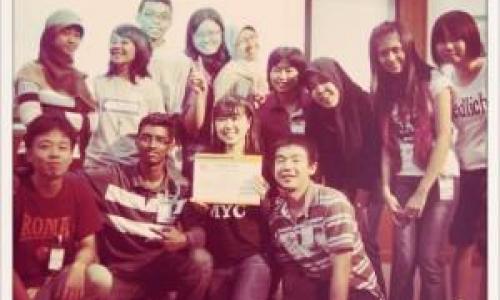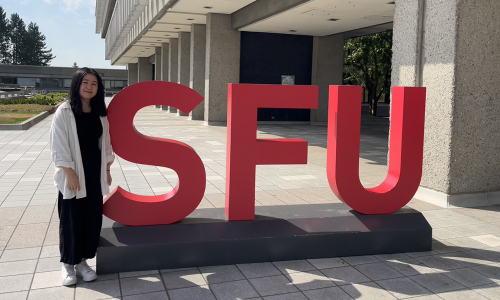
SFU student-led organizations have many volunteer roles and positions open to students. I sat down with Nhi Nguyen’s to get glimpse of her time as the Project Lead of TEDxSFU. Nhi shares what she learnt from this position, the challenges she faced and why she believes students should get engaged.
Why did you apply for the Project Lead position at TEDxSFU?
I had already worked as a creative director with the 2019 team. After being with the team for almost a year, I really liked the team and the team’s work culture. The team was truly diverse; it was made of people with different backgrounds and perspectives. TEDxSFU is not a Beedie club since members are from Health Sciences, Communications, and other faculties as well. So, we had diverse skill sets on the team. This diversity was extremely useful in our planning, organizing and decision making.
Also, I understood how the team was being organized and how we worked from the beginning to the end. I was motivated to apply as a Project Lead because of my design and business skills. I felt that the position of Project Lead was an opportunity for me to contribute to the team and TEDxSFU with my experience and skills. Overall, I applied for this position because it highlighted my strengths and I wanted to continue working with the team.
What were the typical day-to-day activities that you were involved in this position?
With TEDxSFU, there are two project leads. One project lead will handle marketing and design as well as partner relations. The other project lead handles the event logistics and management, hiring speakers and internal operations too. I was hired for the marketing, design, and partner relations. At that time, I would usually attend meetings, meetings with the team, project lead meetings and meetings with the directors as well. On a typical day, I would read and respond to emails from my team, stakeholders like sponsors and TEDx headquarters itself. In terms of marketing, posting, and updating information on our social media pages, monitoring analytics on how TEDxSFU events are being promoted.
For design, I worked alongside the design time, keeping track of the design processes, monitoring the TEDxSFU website and updating the content on it, quality control for the videos and content. For partner relations, I received the cheques and kept track of the expenses relating to sponsorships and partners. I worked with the partner relations team to send out emails, messages and calls to ask for monetary donations and sponsorships.
Your duties as Project Lead seem like a lot to handle. Several students have concerns regarding time management and work-life balance. What did you do to balance your duties and other external responsibilities like school?
It was difficult for me. I was busy with school and midterms, and a case competition. When the event was approaching, it became even tougher. You don’t see many problems until you get closer to the event. I don’t have a specific strategy, but I have a calendar, where I note when to do a task. I allocate a period for the task and try not to exceed that time I set. I ensure that I get the task done within the allocated time frame.
Also, get people to check-in and make sure you are on the right track. My director would check in with me on time, update me and remind me of priority tasks. I may forget some tasks but having people check in with me and checking in with them was immensely helpful. It helped me maintain balance and stay focused. Also, the team meetings were used optimally. We would try to cover a lot of ground and be productive during team meetings. It helped us and we did not have to spend a lot of time working on some tasks after the meeting.
In what areas did this position help you grow, learn, and become a better person?
After my experience with TEDxSFU, I grew to be attached to the team. I enjoyed working with them to the point where I did not feel only like a Project Lead but instead also a friend. In my prior experiences with organizations, I discovered that it is hard to talk to someone above you in the organization. However, I felt like I was friends with the people working for me and I was able to listen to them them talk about anything that they tend to not discuss with Project Leads. As a Project Lead, like anyone in a director position, there are always goals and objectives in mind (i.e. ensuring a successful event, obtaining enough funds to plan an event etc.). I did have those goals, but I tried my best to avoid exhausting my team with far-reaching goals.
In essence, I aimed not to be a top-down leader and engage my team members actively. I separated the goals and objectives into specific periods and aimed to get my team comfortable with these goals and the set time to achieve them. I did not simply delegate the tasks; I also worked with them. I saw myself as a friend and a person that wants to see them grow. I was very intentional about giving them realistic goals. As Project Lead, I learnt a lot about leadership, building a connection with a team and being a supportive leader. I was very content with the experience. Even though we worked together during COVID-19 and it was a virtual event, it was still fun and interesting.

What are some challenges you faced as Project Lead with TEDxSFU?
There were a lot of challenges. Firstly, in terms of the technical side, I got hired in March when COVID-19 first hit. We had to decide whether to have meetings online or not, organize the event virtually or in-person, interview speakers online or not. Everything was so vague. And I knew that it came down to my decision and it was difficult for me to make the decisions. It was one challenge to communicating the decisions made to my team. And it was another getting the speakers to be comfortable with the whole arrangement. Also, online communication tends to be difficult. You can write something, and it may have a positive tone, yet it can also have a negative tone and you are unsure of how the other person will interpret the message.
Miscommunication can also happen. I tried to arrange as many Zoom meetings as often as I could. We created a Slack Channel where we could communicate as well. In fact, we had a channel specifically for fun stuff like jokes, memes, and stickers. It helped the team know each other more and get everyone to be comfortable. The last major challenge I faced was how to make the team feel connected and bond together. It was a goal that I had but also a challenge I faced. I think we still created a bond, but it was hard as the Project Lead to make sure the team was connected and enjoyed working together.
In your own words, why should students be involved in volunteer positions within student-led organizations?
It is important because it helps you gain soft skills, communication skills, teamwork, and leadership skills. Student organizations will resemble the companies that you will work with in the future. In school, you learn the principles and knowledge, but these positions will help you apply them and communicate it to others is why you should get involved. You get to learn technical aspects as well.
For example, you learn that marketing involves social media posting and creating newsletters. In a volunteer position, you can curate those social media posts, know what platforms to create the newsletters and how to use analytics as well. I do not think that I will get the Project Lead position without these skill sets or experience. Also, you will make new friends and meet people. So why not? Go for it!
Can you give some practical counsel to students who are interested in joining student organizations and hope to occupy significant positions within those organizations?
For first-year students, I would advise that you should study what you need to study. While you are studying in school, remain active in other areas outside classes. Even for other students, just keep applying! You can start at small positions, but you learn as you work. Eventually, you can move up to higher positions within the student clubs. Do not be afraid to apply and have an open mind. Be willing to learn. It can be tough being rejected for a position, but it is actually fine. I got turned down for a position in a student club. Then, I pivoted to other clubs and gained experience and skills. When I reapplied to the same club, I actually got a higher position. View the rejection as an opportunity to grow and develop more skills.
How can students stay informed about volunteer positions and roles available at TEDxSFU?
We post it online! Go to our Instagram, LinkedIn and Facebook TEDxSFU pages and you can get updates and openings for different positions.
Taking on the position as a Project Lead for a student organization involves great commitment, a desire to achieve goals while boosting your team’s morale and bond. For Nhi, she gained more insight about being a leader, building on her strengths and appreciating a diverse and closely-knit team. Volunteering within student-led organizations opens limitless possibilities to learn, grow and apply your knowledge in real-life situations. You can discover new interests, build new connections and gain a unique experience. Create a rich and diversified university experience by getting involved today!




















